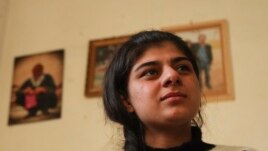13 February 2022
The Islamic State (IS) group enslaved Roza Barakat when she was a young Yazidi girl. IS has been defeated, but she still feels like a prisoner.
She was 11 years old when she was captured and enslaved. Thousands of Yazidi women and girls were taken when the militants overran northern Iraq in their cruel 2014 campaign.
Barakat was taken from her family in the town of Sinjar, the home of the ancient, religious Yazidi minority, to Syria. She was sold and sexually attacked. She gave birth to a child, a boy she has since lost. Now, at 18, she speaks little of her native Kurdish language, Kurmanji.

Roza Barakat poses for a portrait in a safe house in Hassakeh, Syria, Sunday, Feb. 6, 2022.
Change your religion or be a slave
Eventually, her IS captors gave her a choice: Become a Muslim and marry an IS fighter or be sold again. She changed her religion, she says, to avoid being sold. She married a Lebanese man chosen for her. He supplied food and equipment for IS fighters.
"He was better than most," she said. At 13, she gave birth to a son, Hoodh. They lived for a while in Raqqa. As IS began losing control, Barakat fled with her husband. He later died in the fighting.
Barakat is one of many Yazidi women who came of age under the cruel rule of IS. Troubled and lost, many struggle to move on from the past. Iraq's Yazidi community has forced women returning to Sinjar to give up their children as a condition to return. Many of the children have ended up in an orphanage in northeastern Syria.
Faruk Tuzu is co-chair of Yazidi House, a group of Yazidi organizations in northeastern Syria. Speaking of the young women, he said, "After so much shock and abuse, they don't believe in anything anymore, they don't belong anywhere."
Fear being separated from children
Today, over 2,800 Yazidi women and children are still missing, said Tuzu. Some are building new lives outside the community, believing that if they return, they would be killed. Others fear being separated from their children, fathered by IS members.
"This is our mistake, that — we didn't allow the children to stay with their mothers," said Tuzu.
Barakat spoke to the AP from a safe house run by Tuzu's group.
"I don't know how I'll face my community," she told The Associated Press, speaking in Arabic.
By early 2019, as IS rule was failing, U.S.-backed Kurdish Syrian Democratic Forces surrounded Baghouz. Safe passage was offered to women and children.
At this point, Barakat could have stepped forward and identified herself as a Yazidi and sought safety. But instead, she held her baby, Hoodh, in her arms and walked out of the town with other IS wives.
Barakat went to a nearby village rather than going into a camp. With the help of IS sympathizers, she ended up in Idlib, in northwestern Syria, in a home for IS widows. She told the AP that Hoodh died after an airstrike in Idlib.
She found work at a clothing market and dreamed of a new life in Turkey.
Kurdish internal security forces caught her last month. She had been waiting to be taken by smugglers across the Syria-Turkey border.
She was held and questioned for days.
"I did everything to hide that I was Yazidi," she said.
One investigator held up an old photo found on her mobile phone — a young Yazidi woman in an IS slave market — and asked her to explain.
"The words just came out: 'That is my sister,'" Barakat said.
Once she told the truth, Barakat was taken to a safe house in Syria's Hasakah province, where the Yazidi community welcomed her.
"I was in shock to hear their kind words, and to be welcomed the way I was," she said.
She is not ready to go back to Sinjar. Her entire family was either killed or is lost.
What is there to go back to, she wonders. "I need time, for myself."
I'm Jill Robbins.
Samya Kullab reported on this story for the Associated Press. Jill Robbins adapted it for Learning English.
________________________________________________________________
Words in This Story
orphanage – n. a place where children whose parents have died can live and be cared for
allow - v. to let, permit
smuggler – n. a person who moves (someone or something) from one country into another illegally and secretly
What do you think of the story of the Yazidi women? We want to hear from you. Write to us in the Comments Section.